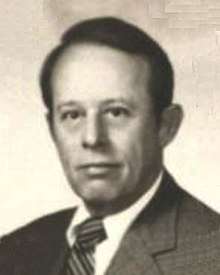Hunter Andrews
Hunter Booker Andrews (May 28, 1921 – January 13, 2005) was a long-serving Democratic member of the Senate of Virginia from Hampton, Virginia. He served as Senate Majority leader of the Senate from 1980 until his defeat in 1995.
Hunter Andrews | |
|---|---|
 | |
| Member of the Virginia Senate from the 1st district | |
| In office January 12, 1972 – January 10, 1996 | |
| Preceded by | William E. Fears |
| Succeeded by | Marty Williams |
| Member of the Virginia Senate from the 28th district | |
| In office January 10, 1968 – January 12, 1972 | |
| Preceded by | Blake T. Newton |
| Succeeded by | Paul Manns |
| Member of the Virginia Senate from the 31st district | |
| In office January 8, 1964 – January 10, 1968 | |
| Preceded by | Fred W. Bateman |
| Succeeded by | None (district eliminated) |
| Personal details | |
| Born | Hunter Booker Andrews May 28, 1921 Hampton, Virginia, U.S. |
| Died | January 13, 2005 (aged 83) Hampton, Virginia, U.S. |
| Political party | Democratic |
| Spouse(s) | Cynthia Bentley Collings |
| Alma mater | College of William & Mary University of Virginia |
| Military service | |
| Allegiance | |
| Branch/service | United States Navy |
| Years of service | 1942–1946 |
| Battles/wars | World War II |
Early life and career
A native and lifelong resident of Hampton, Andrews was born on May 28, 1921. He attended the segregated public schools of his hometown and was a 1938 graduate of Hampton High School. In 1942, he graduated from the College of William & Mary, and subsequently served as an Ensign in the United States Navy for four years in the Pacific Theatre during World War II. Andrews was a 1948 graduate of the University of Virginia Law School.[1] Returning from school, Andrews practiced law in Hampton. He married Cynthia Bentley Collings.
Political career
Andrews served as Chair of the Hampton School Board, leading the city schools through racial integration at a time when other counties and cities were struggling to stop integration as part of a policy of massive resistance. In 1962, he ran for and was elected to the State Senate from the 31st district. He was reelected to 9 terms in the 28th district and from 1972 until 1996 in the 1st district. He rose to be Majority Leader of the Senate from 1980–1995 and served as Chair of the powerful Senate Finance Committee. According to the Washington Post, "Mr. Andrews was the longest-serving senator in the state's history, and when the Democrats controlled the 40-member Senate, he was also its majority leader. He wielded enormous clout during the three decades when the Democrats controlled every branch of the state's government, and his power often matched that of the nine governors under whom he served."[2]
For many years, Andrews served on the Board of Visitors of the College of William & Mary. He was defeated for reelection in 1995, and returned to the practice of law in Hampton until his retirement in 2003. In 1995 the Virginia Bar Association awarded him its Distinguished Service Award.[3]
Death and memorials
Andrews died of a heart attack at his home on January 13, 2005. His funeral was held at St. John's Episcopal Church in Hampton and burial was in the church cemetery.[4] Hunter B. Andrews Elementary School in Hampton, Virginia is named for the senator.
References
- Findagrave.com
- Obituary of Hunter B. Andrews, Washington Post January 14, 2005
- "VBA honors Stolle, Warner, life members' Virginia Lawyers Weekly (July 30, 2007)
- Graveyard
| Senate of Virginia | ||
|---|---|---|
| Preceded by Fred W. Bateman |
Virginia Senate, District 31 1964–1968 |
Succeeded by District Eliminated |
| Preceded by Blake T. Newton |
Virginia Senate, District 28 1968–1972 |
Succeeded by Paul W. Manns |
| Preceded by William E. Fears |
Virginia Senate, District 1 1972–1996 |
Succeeded by Marty Williams |